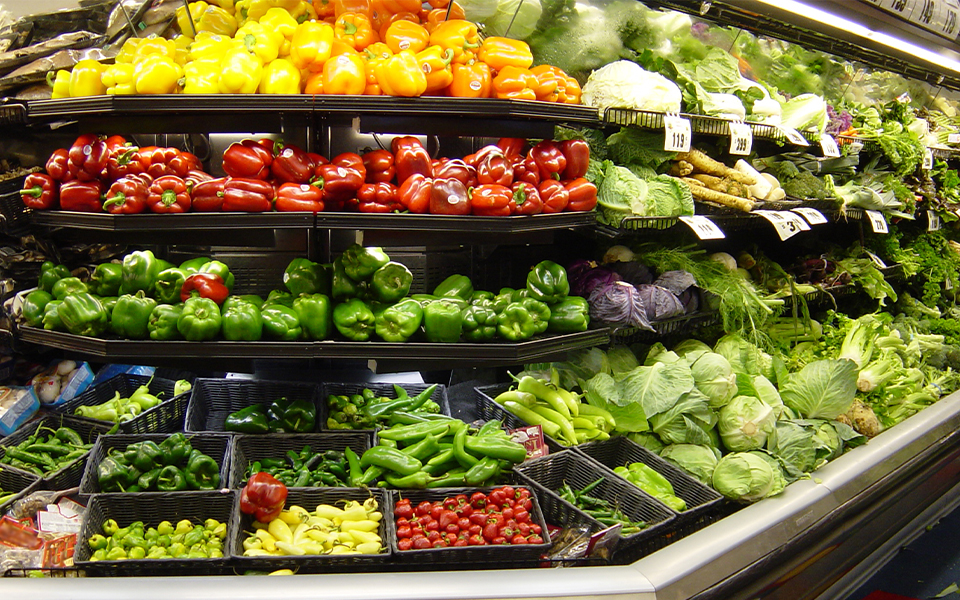*On June 1, 2023 Emerson’s Climate Technologies business became a new standalone company – Copeland. Though our name has changed, we are building on more than a century of HVACR innovation and industry leadership, and Copeland continues to offer the same products, industry stewardship, and learning opportunities you’ve grown to trust. Information found on this webpage posted before June 1, 2023 may contain our old name or branding, but you can be at ease knowing it was created with the knowledge and expertise of Copeland.
Putting our technologies and knowledge to work in pursuit of a better planet is in our DNA at Emerson. It’s ingrained throughout our culture and reinforced in our Purpose: We drive innovation that makes the world healthier, safer, smarter and more sustainable.

Our newest innovation – a unique refrigeration technology developed at our Helix Innovation Center in Dayton, Ohio – will help the local community, where the concept first came to life. Gem City Market, a collaborative grocery store with the mission to equip, engage and empower our neighborhoods will be the recipient of our donation which was made in partnership with Hussmann and Chemours who donated additional refrigeration equipment in service of this intiative. We are proud to help through one of our core areas of expertise: providing sustainable refrigeration technology that can help protect food quality and safety.
The location of Gem City Market qualifies as a “food desert,” according to the U.S. Department of Agriculture Economic Research Service. In order to meet the standards of a food desert, more than 40% of the population must have an income of less than or equal to 200% of the federal poverty threshold and live more than a mile from a supermarket or large grocery store.
Food deserts are a persistent problem in many communities, and supply chain barriers to accessing healthy, affordable food contribute to this global issue. Many local and smaller retail stores within distance of underserved communities struggle to get their shelves stocked with local produce and fresh food due to the lack of perceived customer demand, limited technology and the lack of infrastructure to refrigerate these goods properly.
There are alternatives to costly full-scale refrigeration systems typically seen in supermarkets. Our new Copeland™ scroll booster refrigeration technology will help combat the issue of limited infrastructure to properly store perishables at Gem City Market. The first commercialization of technology developed at our Helix Innovation Center in Dayton, the Copeland scroll booster is a new-to-the-world flexible refrigeration architecture. This booster technology enables Gem City to use a lower global-warming potential refrigerant to store food at its optimal temperature, helping them meet their sustainability goals and achieve stringent regulatory compliance.
Our scroll booster technology is a new architecture option for those who are in search of sustainable solutions – and is a testament to the power of innovation and collaboration. When committed people come together, we can create options for families to shop for nutritious food in their own communities. And when problem solvers come together in the name of leaving the world a better place, they are truly unstoppable.
Our newest innovation – a unique refrigeration technology developed at our Helix Innovation Center in Dayton, Ohio – will help the local community, where the concept first came to life. Gem City Market, a collaborative grocery store with the mission to equip, engage and empower our neighborhoods will be the recipient of our donation which was made in partnership with Hussmann and Chemours who donated additional refrigeration equipment in service of this intiative. We are proud to help through one of our core areas of expertise: providing sustainable refrigeration technology that can help protect food quality and safety.
The location of Gem City Market qualifies as a “food desert,” according to the U.S. Department of Agriculture Economic Research Service. In order to meet the standards of a food desert, more than 40% of the population must have an income of less than or equal to 200% of the federal poverty threshold and live more than a mile from a supermarket or large grocery store.
Food deserts are a persistent problem in many communities, and supply chain barriers to accessing healthy, affordable food contribute to this global issue. Many local and smaller retail stores within distance of underserved communities struggle to get their shelves stocked with local produce and fresh food due to the lack of perceived customer demand, limited technology and the lack of infrastructure to refrigerate these goods properly.
There are alternatives to costly full-scale refrigeration systems typically seen in supermarkets. Our new Copeland™ scroll booster refrigeration technology will help combat the issue of limited infrastructure to properly store perishables at Gem City Market. The first commercialization of technology developed at our Helix Innovation Center in Dayton, the Copeland scroll booster is a new-to-the-world flexible refrigeration architecture. This booster technology enables Gem City to use a lower global-warming potential refrigerant to store food at its optimal temperature, helping them meet their sustainability goals and achieve stringent regulatory compliance.
Our scroll booster technology is a new architecture option for those who are in search of sustainable solutions – and is a testament to the power of innovation and collaboration. When committed people come together, we can create options for families to shop for nutritious food in their own communities. And when problem solvers come together in the name of leaving the world a better place, they are truly unstoppable.

Facility Health Score Insights Program Transforms Enterprise Maintenance
Leveraging refrigeration performance data drives food retail cost reductions. Maintaining proper...

8 proven strategies for rigorous cold chain management
Preparing for the approval and safe use of A2Ls in commercial refrigeration applications...
Protection for high-value shipments just got even better
We’re excited to announce the release of Copeland’s newest real-time tracker, the GO Real-Time...
